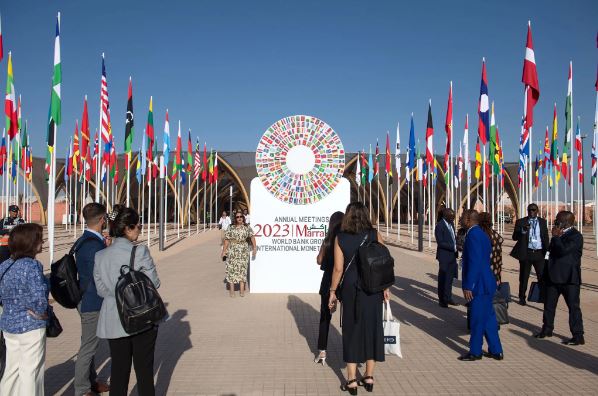As a new conflict in the Middle East threatens to upend a global economy already reeling from many years of overlapping crises, the International Monetary Fund warned on Tuesday that the speed of the global economic recovery is weakening.
An example of how difficult it is to protect economies against increasingly frequent and unpredictable global shocks is the weekend’s outbreak of hostilities between Israel and Hamas, which may spread instability across the region. The crisis has put a shadow on the annual meetings of the International Monetary Fund and the World Bank, which are being held in Morocco.
The new issue comes at a bad time for government officials already dealing with the aftermath of the epidemic and Russia’s conflict in Ukraine.
Mr. Banga claimed that the assaults in the Middle East have had less of an effect on the global economy than the conflict in Ukraine. Since Russia is a leading energy producer and Ukraine is a big supplier of grain and fertiliser, the conflict initially caused oil and food prices to skyrocket, causing turmoil in world markets.
There is already anxiety in the oil market. London Business School professor and former head of research at the European Central Bank Lucrezia Reichlin remarked, “The main question is what is going to happen to energy prices.”
Ms. Reichlin worries that if oil prices climb again, the Federal Reserve and other central banks may feel compelled to further increase interest rates, which she previously said had already increased too quickly.
It is too soon to tell if the current increase in oil prices can be sustained, according to Pierre-Olivier Gourinchas, the I.M.F.’s top economist. If so, he added, studies suggest that the world economy would suffer a 0.15 percent drop in output and a 0.4 percent rise in inflation in the next year due to a 10% increase in oil prices.
The I.M.F. highlighted the precarious nature of the recovery in its most recent World Economic Outlook. The organisation is maintaining its 3% prediction for global expansion this year and lowering it to 2.9% for 2024. The I.M.F. raised its forecast for U.S. output this year, but lowered its forecast for the euro area and China and warned of rising distress in China’s real estate industry.
The European economy is particularly vulnerable when international tensions rise. European countries have been desperately trying to wean themselves off Russian natural gas since Russia’s invasion of Ukraine in February 2022.
It’s possible that some oil providers might disagree with you. For instance, Algeria, which has upped its natural gas supplies to Italy, has criticised Israel for reacting with bombings on Gaza.
The energy shift has had a negative impact on European economy before the events of the past weekend. The fund projects a 0.7% growth rate for the 20 nations that use the euro this year, down from 3.3% in 2022. The largest economy in Europe, Germany, is predicted to decrease by 0.5%.
Growth in Britain is predicted to fall to 0.5% this year from 4.1% in 2022 because to high interest rates, persistent inflation, and the repercussions of skyrocketing energy costs.
The slowdown has spread to Sub-Saharan Africa. Although growth is expected to slow to 3.3% this year, expectations for next year’s growth rate of 4% are more optimistic.
Many of these countries are threatened with staggering levels of debt. Debt levels have doubled in a decade, and currently average 60% of GDP in the region. The expense of making payments has increased as interest rates have risen.
The globe is grappling with a reevaluation of global supply networks and intensifying geopolitical conflicts as the next generation of sovereign debt crises unfolds. An additional layer of difficulty is added by projections that show poor nations would need fresh funding amounting to trillions of dollars over the next decade to prevent the worst effects of climate change.
What effect China’s slowing economy will have on the global economy is a pressing concern for policymakers. The International Monetary Fund (IMF) has cut its growth projection for China twice this year, most recently on Tuesday owing to “subdued” consumer confidence and a slowdown in industrial production. The report expressed concern that nations in the Asian industrial supply chain would be vulnerable to this slowdown.
Janet L. Yellen, the U.S. Treasury Secretary, said in an interview while en route to the meetings that she did not expect China’s economic downturn to have a negative impact on the U.S. economy because she believes the country has the means to confront a “complex set of economic challenges.”

